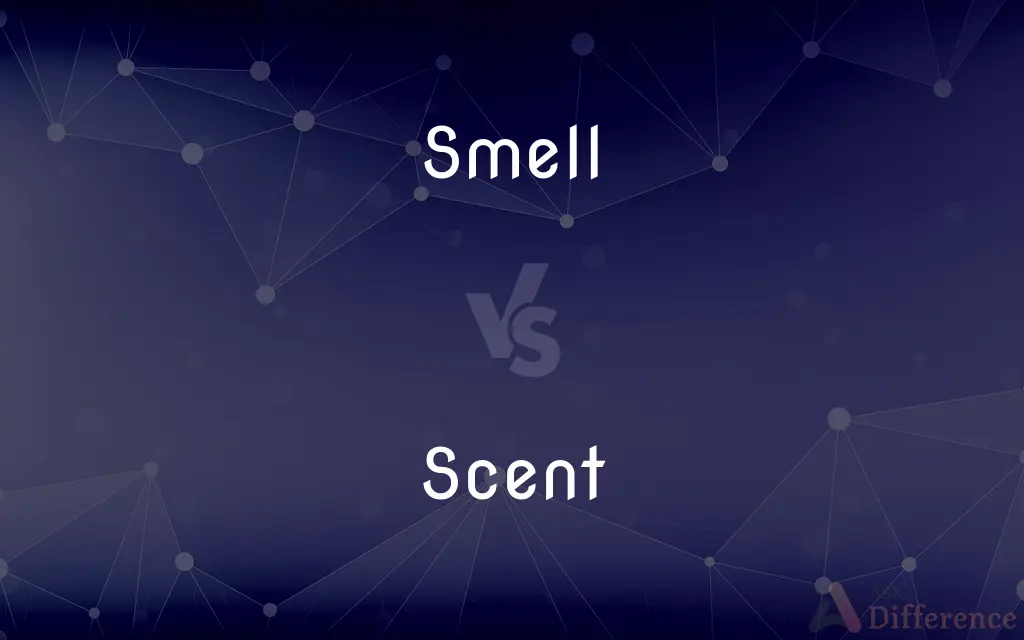Smell vs. Scent — What's the Difference?
By Tayyaba Rehman & Maham Liaqat — Updated on March 10, 2024
Smell refers to the ability to detect odors or the act of perceiving odors, while scent is a specific, often pleasant, odor itself.

Difference Between Smell and Scent
Table of Contents
ADVERTISEMENT
Key Differences
Smell is a term that broadly encompasses the ability to detect odors through the nose, as well as the act of perceiving these odors. It can refer to both pleasant and unpleasant odors. On the other hand, scent specifically refers to a distinctive smell, often one that is pleasant or designed to be pleasant, such as those from perfumes, flowers, or natural environments.
While smell can be used in both positive and negative contexts (e.g., the smell of fresh bread vs. the smell of decay), scent typically carries a positive connotation or implies an intention behind the odor (e.g., the scent of lavender meant to relax or the scent a predator uses to track). Scent can also imply subtlety and is often associated with something that is intentionally detected or followed.
Smell is also a fundamental sensory function that animals and humans possess, allowing them to interact with their environment by detecting chemical substances in the air. In contrast, a scent often involves a source emitting a specific smell for a purpose, such as attraction, identification, or communication.
In practical usage, "smell" is a more general and versatile term, applicable in a wide range of contexts to describe the act of smelling or the odors themselves, regardless of their source or quality. "Scent," however, is usually used to describe a specific smell that is either pleasing or has a particular significance, such as the scent of a person, a flower, or a perfume.
The choice between "smell" and "scent" can also reflect the speaker's attitude towards the odor. Using "smell" can be neutral or indicate a spontaneous detection of odors, while "scent" often suggests a deliberate focus on or appreciation of a particular odor.
ADVERTISEMENT
Comparison Chart
Definition
The ability to detect odors or the act of perceiving odors.
A specific, often pleasant, odor.
Connotation
Neutral or can be positive or negative.
Typically positive, implying pleasantness.
Usage Context
General and broad, applicable to any odor.
Specific and often associated with intention or attractiveness.
Function
Sensory perception.
Emission with a purpose (attraction, identification, etc.).
Versatility
More versatile, used to describe any type of odor.
More specific, usually pleasant or purposeful smells.
Compare with Definitions
Smell
The ability to perceive odors through the olfactory senses.
The dog's sense of smell is far superior to that of humans.
Scent
A specific and often pleasant smell.
The scent of roses wafted through the garden.
Smell
The general presence of odors in an environment.
The smells of the city can be overwhelming to newcomers.
Scent
A fragrance used in products or personal application.
He preferred a cologne with a woodsy scent.
Smell
The act of detecting odors by using the nose.
He took a deep breath to smell the fresh air.
Scent
A trace of something that can be followed.
The hounds picked up the scent of the fox.
Smell
A particular odor, not specified as pleasant or unpleasant.
There's a strange smell in this room.
Scent
An odor that is deliberately produced or emitted.
She wore a scent that reminded him of summer.
Smell
An odor that is often strong or distinctive.
The smell of garlic filled the kitchen.
Scent
A quality of being subtly perceptible.
There was a scent of mystery about the old house.
Smell
The sense, located in the nasal cavities of mammals and relying on the olfactory nerves, by which molecules borne in a fluid such as air can be perceived; the olfactory sense.
Scent
A distinctive smell, especially one that is pleasant
The scent of freshly cut hay
Smell
A similar sense in other animals, as insects' ability to perceive air-borne molecules with their antennae.
Scent
A trail indicated by the characteristic smell of an animal and perceptible to hounds or other animals
The hound followed the scent
Smell
The act or an instance of smelling
Got a smell of the pie.
Scent
The faculty or sense of smell
The dog, having the help of scent as well as of sight
Smell
A quality of something that is perceived by the sense of smell; an odor
The smell of a barn.
Scent
Impart a pleasant scent to
A glass of tea scented with a local herb
Smell
A distinctive enveloping or characterizing quality; an aura or trace
The smell of success.
Scent
A distinctive, often agreeable odor.
Smell
To perceive (an odor) by the sense of smell.
Scent
A perfume
An expensive French scent.
Smell
To perceive or detect (something) by a chemosensory organ, such as an antenna.
Scent
An odor left by the passing of an animal.
Smell
To inhale the air near (something); sniff
Smiled as she smelled the rose.
Scent
The trail of a hunted animal or fugitive
The hounds are on the scent.
Smell
To detect or discover, as by intuition or inference
We smelled trouble ahead. The committee tried to smell out corruption in law enforcement.
Scent
The sense of smell
A bear's keen scent.
Smell
To use the sense of smell.
Scent
A hint of something imminent; a suggestion
Caught the scent of a reconciliation.
Smell
To sniff
The dog was smelling around the bed.
Scent
To perceive or identify by the sense of smell
Dogs scenting their prey.
Smell
To have or emit an odor
"The breeze smelled exactly like Vouvray—flowery, with a hint of mothballs underneath" (Anne Tyler).
Scent
To suspect or detect
Scented danger.
Smell
To have or emit an unpleasant odor; stink
This closet smells.
Scent
To fill with a pleasant odor; perfume
When blossoms scent the air.
Smell
To be suggestive; have a touch of something
A remark that smells of sanctimony.
Scent
To hunt prey by means of the sense of smell. Used of hounds.
Smell
To appear to be dishonest or corrupt
The political situation is starting to smell.
Scent
A distinctive smell.
The scent of flowers / of a skunk
To give off / release / exude a scent
To breathe in / inhale a scent
Smell
A sensation, pleasant or unpleasant, detected by inhaling air (or, the case of water-breathing animals, water) carrying airborne molecules of a substance.
I love the smell of fresh bread.
Scent
A smell left by an animal that may be used for tracing.
The dogs picked up / caught the scent but then quickly lost it.
Smell
(physiology) The sense that detects odours.
Scent
A substance (usually liquid) created to provide a pleasant smell.
A scent shop
A scent bazaar
Smell
(transitive) To sense a smell or smells.
I can smell fresh bread.
Smell the milk and tell me whether it's gone off.
Scent
(figuratively) Any trail or trace that can be followed to find something or someone, such as the paper left behind in a paperchase.
The minister's off-hand remark put journalists on the scent of a cover-up.
The tip put the detectives on a false / the wrong scent.
Smell
Followed by like or of if descriptive: to have a particular smell, whether good or bad.
The roses smell lovely.
Her feet smell of cheese.
The drunkard smelt like a brewery.
Scent
(obsolete) Sense, perception.
Smell
To smell bad; to stink.
Ew, this stuff smells.
Scent
(transitive) To detect the scent of; to discern by the sense of smell.
The hounds scented the fox in the woods.
Smell
To have a particular tincture or smack of any quality; to savour.
A report smells of calumny.
Scent
(ambitransitive) To inhale in order to detect the scent of (something).
Smell
To detect or perceive; often with out.
Scent
To have a suspicion of; to detect the possibility of (something).
I scented trouble when I saw them running down the hill towards me.
Smell
(obsolete) To give heed to.
Scent
(transitive) To impart an odour to, to cause to have a particular smell.
Scent the air with burning sage before you begin your meditation.
Smell
(transitive) To smell of; to have a smell of
Scent
To have a smell; (figuratively) to give an impression (of something).
Smell
To perceive by the olfactory nerves, or organs of smell; to have a sensation of, excited through the nasal organs when affected by the appropriate materials or qualities; to obtain the scent of; as, to smell a rose; to smell perfumes.
Scent
To hunt animals by means of the sense of smell.
Smell
To detect or perceive, as if by the sense of smell; to scent out; - often with out.
Can you smell him out by that?
Scent
To perceive by the olfactory organs; to smell; as, to scent game, as a hound does.
Methinks I scent the morning air.
Smell
To give heed to.
From that time forward I began to smellthe Word of God, and forsook the school doctors.
Scent
To imbue or fill with odor; to perfume.
Balm from a silver box distilled around,Shall all bedew the roots, and scent the sacred ground.
Smell
To affect the olfactory nerves; to have an odor or scent; - often followed by of; as, to smell of smoke, or of musk.
Scent
To have a smell.
Thunderbolts . . . do scent strongly of brimstone.
Smell
To have a particular tincture or smack of any quality; to savor; as, a report smells of calumny.
Praises in an enemy are superfluous, or smell of craft.
Scent
To hunt animals by means of the sense of smell.
Smell
To exercise the sense of smell.
Scent
That which, issuing from a body, affects the olfactory organs of animals; odor; smell; as, the scent of an orange, or of a rose; the scent of musk.
With lavish hand diffuses scents ambrosial.
Smell
To exercise sagacity.
Scent
Specifically, the odor left by an animal on the ground in passing over it; as, dogs find or lose the scent; hence, course of pursuit; track of discovery.
He gained the observations of innumerable ages, and traveled upon the same scent into Ethiopia.
Smell
The sense or faculty by which certain qualities of bodies are perceived through the instrumentally of the olfactory nerves. See Sense.
Scent
The power of smelling; the sense of smell; as, a hound of nice scent; to divert the scent.
Smell
The quality of any thing or substance, or emanation therefrom, which affects the olfactory organs; odor; scent; fragrance; perfume; as, the smell of mint.
Breathing the smell of field and grove.
That which, above all others, yields the sweetest smell in the air, is the violent.
Scent
A distinctive odor that is pleasant
Smell
The sensation that results when olfactory receptors in the nose are stimulated by particular chemicals in gaseous form;
She loved the smell of roses
Scent
An odor left in passing by which a person or animal can be traced
Smell
Any property detected by the olfactory system
Scent
Any property detected by the olfactory system
Smell
The general atmosphere of a place or situation and the effect that it has on people;
The feel of the city excited him
A clergyman improved the tone of the meeting
It had the smell of treason
Scent
Cause to smell or be smelly
Smell
The faculty of smell
Scent
Catch the scent of; get wind of;
The dog nosed out the drugs
Smell
The act of perceiving the odor of something
Scent
Apply perfume to;
She perfumes herself every day
Smell
Inhale the odor of; perceive by the olfactory sense
Smell
Emit an odor;
The soup smells good
Smell
Smell bad;
He rarely washes, and he smells
Common Curiosities
Is it correct to use "scent" for unpleasant odors?
Typically, "scent" is used for pleasant or neutral odors, not for unpleasant ones.
Is the sense of smell important?
Yes, the sense of smell is crucial for detecting dangers (like fire or spoiled food), enjoying food flavors, and experiencing emotions linked to memories.
How do animals use smell and scent?
Animals use their sense of smell to detect odors in their environment, while they may emit scents for communication, identification, or attraction.
What is the difference between smell and scent?
Smell refers to the general ability to detect odors, while scent specifically refers to a pleasant or purposeful odor.
Can a person have a scent?
Yes, a person can have a scent, often referring to the combination of their personal fragrance and natural odors.
What is a "signature scent"?
A "signature scent" is a fragrance that someone consistently wears, becoming closely associated with them.
Can all smells be considered scents?
Not all smells are considered scents, as "scent" usually implies a pleasant or intentionally produced odor.
Why do some smells trigger memories?
Smells trigger memories because the olfactory system is closely linked to the brain areas responsible for emotion and memory.
How do you describe a smell?
Describing a smell involves comparing it to known odors, describing its intensity, and expressing the emotions or memories it evokes.
How do you improve your sense of smell?
Improving your sense of smell can involve practicing scent detection, avoiding smoking, and maintaining overall health.
Can smells affect mood?
Yes, smells can significantly affect mood and emotional states, with certain scents inducing relaxation or alertness.
What is scent marketing?
Scent marketing involves using specific scents in businesses or products to enhance customer experience and influence behavior.
How do manufacturers create different scents for products?
Manufacturers combine various natural and synthetic aromatic compounds to create unique scents for products.
Why do perfumes have different scents?
Perfumes have different scents to appeal to personal preferences and to evoke different emotions or memories.
Are scent and aroma the same?
Aroma is often used to refer specifically to pleasant or appetizing food smells, making it a subset of scents.
Share Your Discovery

Previous Comparison
Lacklustre vs. Lackluster
Next Comparison
Outlast vs. OutliveAuthor Spotlight
Written by
Tayyaba RehmanTayyaba Rehman is a distinguished writer, currently serving as a primary contributor to askdifference.com. As a researcher in semantics and etymology, Tayyaba's passion for the complexity of languages and their distinctions has found a perfect home on the platform. Tayyaba delves into the intricacies of language, distinguishing between commonly confused words and phrases, thereby providing clarity for readers worldwide.
Co-written by
Maham Liaqat













































